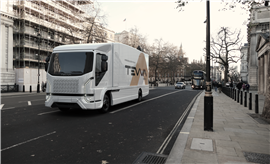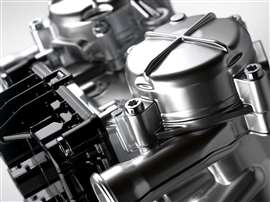ZF and Tevva collaborate on regenerative braking
19 June 2023
 ZF’s electronic brake system has been adapted for deployment in Tevva’s 7.5t battery-electric truck. (Photo: Tevva)
ZF’s electronic brake system has been adapted for deployment in Tevva’s 7.5t battery-electric truck. (Photo: Tevva)
ZF’s Commercial Vehicle Solutions (CVS) worked with British electric vehicle manufacturer Tevva to adapt its electronic brake system (EBS) for deployment in Tevva’s 7.5t battery-electric vehicle (BEV). The vehicle uses a blend of regenerative and compressed air brakes as an added layer of safety and responsiveness for drivers, Tevva said.
The EBS is designed to control the blending of friction braking with the e-motor, reducing brake wear and tear. It transfers the driver’s deceleration request electronically to all braking system components to shorten response time, balance brake forces and provide ease of braking and efficient brake management, Tevva noted.
The company’s engineers worked with ZF to integrate the EBS into the truck, including working on fine-tuning the vehicle control unit (VCU) to enhance compatibility with the EBS. The adapted system successfully met a range of testing criteria, involving a variety of conditions, gradients and surface types, to receive ZF’s approval. Testing took place at the ZF test track in Jeversen, Germany.
“We have worked hard to secure a ringing endorsement from arguably one of the world’s most significant Tier 1 suppliers,” said Tevva’s Uzair Jilani, Lead Engineer, Drive and Brake Systems. “The system has been adapted for use with our regen system – when the brake pedal is pushed, most of the ‘braking’ is handled by regen, meaning that the drive system slows the vehicle down.”
“Our broad product portfolio, including ZF’s standardized Electronic Braking System, enables faster time to market for new, innovative market players such as Tevva,” noted Heiko Eggers, ZF’s head of Commercial Vehicle EMEA Application Engineering for Braking and ADAS. “Their commitment and agile engineering expertise allowed us to meet our stringent safety requirements and complete our project.”
 ZF Electronic Braking System. (Photo: ZF / Tevva)
ZF Electronic Braking System. (Photo: ZF / Tevva)
Implementation of the EBS allowed for safe incorporation of regenerative braking up to 180 kW, compared to a traditional air brake system that limited passive regen to around 40 kW due to safety considerations, Tevva said. With up to four times more energy than a conventional compressed air brake system, it means range for the truck has been optimized.
“The conventional braking system is still needed to bring the truck to a complete stop, but this double layer of safety is an excellent aid to more efficient driving. It also means that the hardware undergoes less strain to extend the braking system’s life in the long run,” said Jilani.
Mass production of Tevva’s 7.5t BEV has begun mass at the company’s London facility. The vehicle, suited for last-mile and urban delivery fleets, offers a range of up to 140 miles (227 km) per charge from its 105-kWh battery. The company plans to follow with a 7.5t hydrogen-electric truck with a hydrogen range extender that allows for a range of up to 354 miles (570 km).
STAY CONNECTED




Receive the information you need when you need it through our world-leading magazines, newsletters and daily briefings.
POWER SOURCING GUIDE
The trusted reference and buyer’s guide for 83 years
The original “desktop search engine,” guiding nearly 10,000 users in more than 90 countries it is the primary reference for specifications and details on all the components that go into engine systems.
Visit Now
CONNECT WITH THE TEAM










